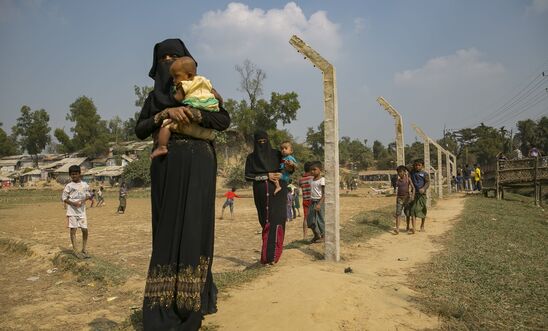
Press releases
Bangladesh: Plan to relocate hundreds of Rohingya to remote island must be dropped

Bay of Bengal silt island not declared safe for human habitation
Refugees in Cox’s Bazar say they’ve been coerced into registering for relocation
‘The Bangladeshi authorities must let the UN carry out an assessment of Bhashan Char’ - Omar Waraich
The Bangladeshi authorities must abandon plans to relocate more than 100 Rohingya families to a remote island in the Bay of Bengal which has not been declared safe for human habitation, Amnesty International said today.
According to local media reports, Bangladesh has completed preparations to relocate up to 400 Rohingya refugees to the silt island of Bhashan Char this month on a “voluntary basis”. But Rohingya refugees, interviewed by Amnesty this month, say that government officials in charge of refugee camps in Cox’s Bazar have coerced them into registering for relocation.
Amnesty has obtained a partial list of the families identified for relocation to Bhashan Char, where more than 300 Rohingya refugees are already living in poor conditions.
Coerced into relocation
Amnesty interviewed five family members who represent 23 refugees on the list for relocation.
One Rohingya woman told Amnesty that she has registered to go to the island because her husband is there. As a single parent with a young child and no relatives in the refugee camp, she has faced many problems.
She said:
“It’s very difficult to live this refugee life. I don’t have any other option. It seems that the government will never allow my husband to get out of the island.”
Two Rohingya families were put on the relocation list after they reported damage to their shelters. Instead of having their shelters repaired, they were told they must relocate to Bhashan Char.
The head of one of the families told Amnesty:
“I requested many times to the NGOs and camp authority for support to fix my shelter. We are still having difficulty staying in the shelter. They are not helping me to relocate within the camp or to other camps.”
A 33-year-old head of a five-person family told Amnesty that he registered to relocate to the island in 2019 but has now changed his mind:
“I wanted to relocate to the island at that time to escape from a society where some powerful people were discriminating against the poor. The community leaders were abusing their power on me. But the problem is resolved now.”
A senior Rohingya community leader also told Amnesty that government officials in charge of camps had put pressure on them to provide lists of refugees to be relocated.
Omar Waraich, Head of South Asia at Amnesty International, said:
“Aside from the fact that Bhashan Char has not been deemed safe for human habitation by the UN, there are serious questions over this relocation procedure.
“Many of the Rohingya we have spoken to have not given full and informed consent to being moved to an island they know nothing about.
“Any decisions relating to the relocation of refugees must be transparent and involve the full participation of the Rohingya people. In the meantime, plans for any further relocations must be abandoned.
“The Bangladeshi authorities must let the UN carry out an assessment of Bhashan Char and immediately return the hundreds of Rohingya refugees currently on the island to their families in Cox’s Bazar.
“Bangladesh has demonstrated commendable generosity in hosting nearly a million Rohingya refugees. Rather than hasty relocations that leave both Bangladesh and the Rohingya in further limbo, this protracted situation requires the local, international and Rohingya community to work together to find a sustainable solution.”
Amnesty is also calling for unfettered access to Bhashan Char for rights and humanitarian organisations to carry out independent assessments.